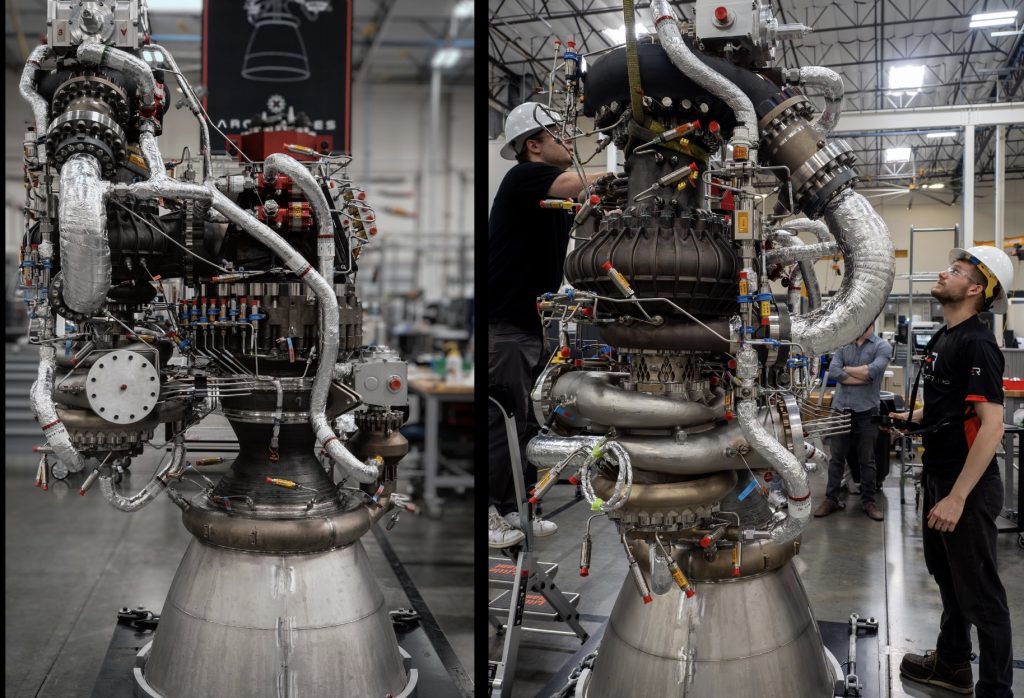Rocket Lab is getting ready to start testing the first Archimedes engine for its Neutron launch vehicle. However, the company has announced that the rocket won't be ready for its first flight until the middle of 2025.
On May 6, Rocket Lab announced the completion of the first Archimedes engine and its installation on a test stand at the Stennis Space Center in Mississippi. The company has initiated a test campaign for the methane/liquid oxygen engine, which includes several engine system activations before a static-fire test.
Previously, the company had stated that the development of Archimedes and the overall Neutron rocket was on track for a first launch around the end of the year. During a February earnings call, the company reaffirmed this timeline.However, in the announcement about Archimedes testing, Rocket Lab stated that it now anticipates a first launch of the rocket no earlier than mid-2025.
During an earnings call on May 6 about Rocket Lab’s first quarter financial results, Peter Beck, the company's chief executive, mentioned that the delay was not due to a specific technical problem with the engine or rocket. He stated, “We didn’t encounter a major technical challenge, just a myriad of smaller issues that accumulated.”
Many in the industry doubted Rocket Lab’s earlier schedule for Neutron’s first launch because the company had not yet started testing Archimedes, which for some other engines, begins years before the first flight. Beck acknowledged in the earnings call that engine development is the “longest lead time” in the development of any new launch vehicle.
Beck mentioned, “Attempting to get Neutron to the launch pad this year was a challenging schedule that we could have achieved if every single aspect went exactly according to plan. But as we’ve always said, this is a rocket development program and challenges always arise, some within our control and some not.”
He later stated in the call that the revised timeline is still an ambitious schedule that allows for no significant schedule margin. “It’s nearly impossible to build a sensible engineering buffer because the elements causing issues are unpredictable,” he added, saying that if his company’s engineers had added margin to their schedules, the first launch would have been in 2040.
Rocket Lab is making progress in other areas of Neutron, constructing composite structures for parts of the rocket as well as components of the vehicle’s launch site, Launch Complex 3 at Wallops Island, Virginia. Adam Spice, Rocket Lab’s chief financial officer, mentioned that the company still plans to spend $250 million to $300 million on the development of Neutron.
The company also adjusted its previous forecasts for launches of its Electron rocket. The small launch vehicle has been launched five times this year, with the next launch scheduled for no earlier than May 22nd, carrying the first of two cubesats for NASA’s PREFIRE Earth science mission. The second cubesat will be launched on another Electron no later than three weeks after the first.
The company stated during their February earnings call that they expected to have 22 Electron launches in 2024, with two of them being a suborbital version called HASTE. However, Beck mentioned on the May 6 call that it's unlikely they'll be able to do all 22 because of delays from customers.
“Out of the 22 missions that were sold for 2024, we are seeing some changes in the schedule, as anticipated, because customers are late with their spacecraft or requesting to move to later in the year, or even into 2025,” he said, calling those changes to customer schedules “a game of manifest whac-a-mole.”
He mentioned that the company is expected to exceed the 10 Electron launches they did in 2023, but did not provide a new estimation. “It’s really difficult to predict as the customers adjust their schedules,” he said. “But I believe it's fair to say that, at this point, we’ll have difficulty achieving 22, but we can probably see a couple less than that.”
The company made $92.8 million in revenue in the first quarter of 2024, a 69% increase compared to the first quarter of 2023. The company had a net loss of $44.3 million in the quarter, slightly better than the $45.6 million net loss it had in the first quarter of 2023.









